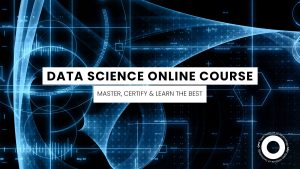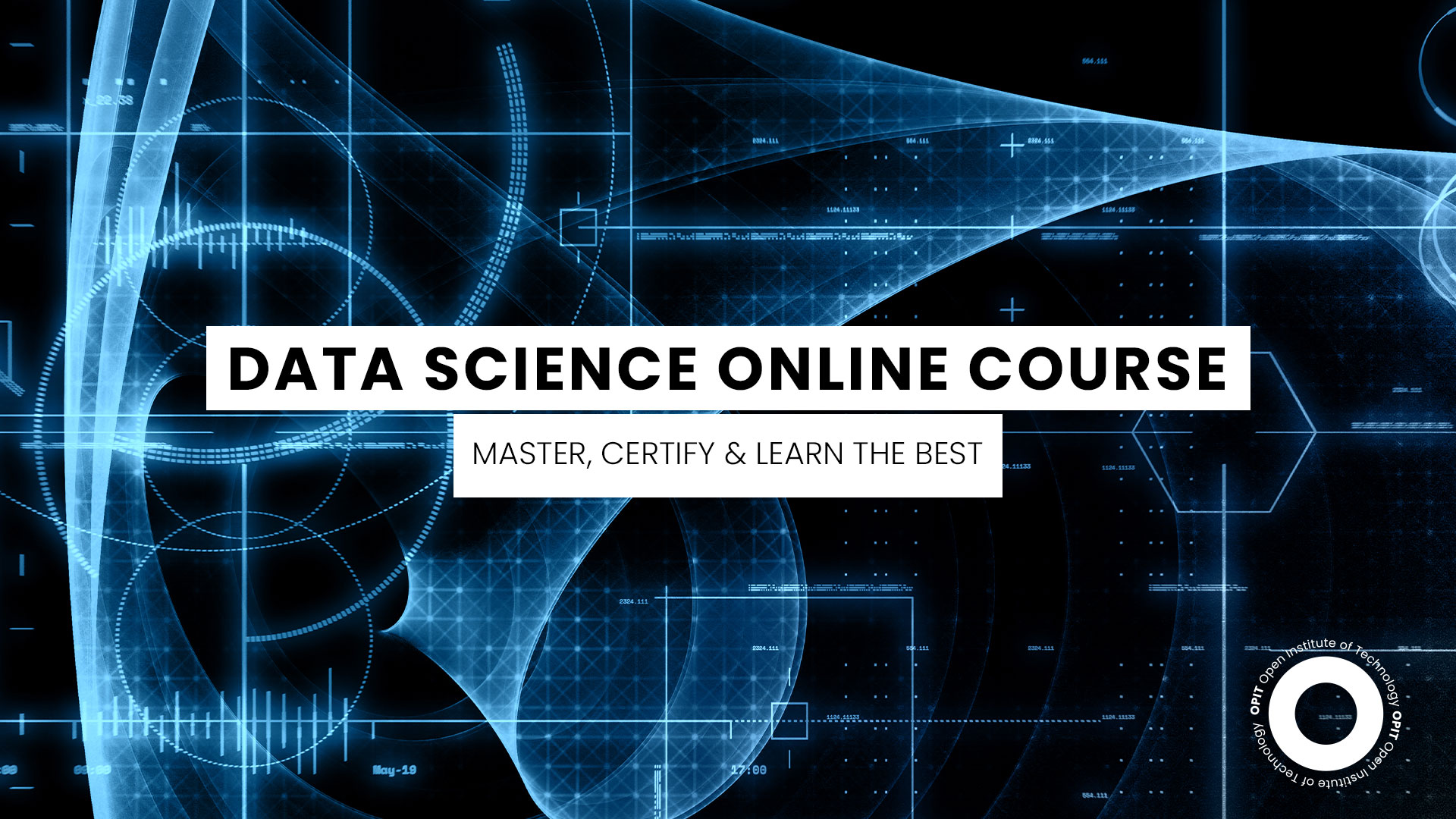

Digital technologies pretty much run the modern world. From our phones and computers to manufacturing, finance, and retail, so many aspects of life rely on machines crunching unimaginable quantities of data.
As a discipline at the core of this digital era, data science is still expanding its scope. Leading organizations in this sector never seem to get enough of new talent, and the demand for data science specialists is constantly rising.
Luckily, the same digital-first environment that depends on data science also gives ample opportunities for learning this essential trade. You can easily find a data science course online, and the same goes for certifications. Better yet, there are Masters programs you can take without leaving your home.
If the prospect of online data science courses sounds exciting, this article will recommend some of the best available programs.
Top Data Science Online Courses
There’s no shortage of options to learn data science online. The courses that made our list come from prestigious institutions and offer the most comprehensive approach to the subject.
When choosing the top courses, we followed straightforward criteria. We looked into institution reputation, hands-on experiences, lecture quality, and comprehensiveness. Here are the best online data science courses that excelled in these categories.
Metis – Data Science & Analytics Training
If you’re looking for an online course with live lectures, then Data Science & Analytics Training from Metis will be a great choice. The lecturers come from leading tech companies, giving lessons that cover the complete data science process.
While there are advanced bootcamps on offer, Metis provides a comprehensive beginner data science online course with certificate, which lasts for six weeks. The price for this course is $750 (roughly 695 euros at time of writing). This course offers an accredited certificate.
Dataquest – Introduction to Python Programming
Dataquest is somewhat unique as it represents a knowledge repository for standalone learning or as a supplementary resource. If you want to learn data science with this platform, the Introduction to Python Programming course is a quality choice.
The class is brief, informative, and suited for beginners. It consists of six lessons and a practical project, with an estimated 12 hours needed to complete the self-paced course. While the introductory course doesn’t offer certification, it will open up a learning path with Dataquest that does end up in winning an expert-reviewed credential.
A third of the learning resources is available for free. The full access to Dataquest courses will require a subscription to the service with a monthly or yearly model.
Harvard University – CS109 Data Science
Getting education from Harvard is about as elite as one can get. The CS109 Data Science course embodies all the benefits of learning from a prestigious institution like Harvard. The course teaches data science essentials, including Python programming, statistics, and machine learning. The complete material is accessible on dedicated GitHub pages. You can clone the repository to get access to the entire curriculum.
Since this is just the repository of resources, going through them won’t give you a certificate. However, it’s free and completely available online, making it an educational opportunity you shouldn’t miss. With the detailed knowledge of the basics under your belt, you’ll progress to more complex (and pricier) courses with ease.
Online Data Science Master’s Programs
You might think that getting a master’s diploma requires you to physically attend a college. And while that used to be the case only a few decades ago, you can enroll in a master’s program online. Better yet, you may do so at a reputable institution with a world-leading data science department.
We picked several top-tier online data science masters programs online. Our choice was based on similar criteria as for the courses:
- How reputable is the institution?
- Does the program offer practical knowledge?
- Are the lectures comprehensive and quality-made?
With all that in mind, here are our top choices of online master’s programs in data science.
University of Aberdeen – Data Science MSc
The University of Aberdeen is one of the leading educational institutions in the UK. The Data Science MSc program is the university’s regular MSc data science online program that’s also completely available online. The curriculum includes vital skills concerning algorithms, data analysis, mathematical modeling, and more.
With full-time learning, the degree can be completed in one year. However, you can study at your own pace and take as much time as you need between individual courses. The limit for completion is six years, and enrolling in the program will cost £14,920.
Rome Business School – International Online Master in Data Science
The International Online Master in Data Science from the Rome Business School represents an excellent opportunity to learn, get in touch with industry-leading companies, and build a professional network. The school houses bootcamps across Europe and worldwide, which may increase your job market reach.
The participation fee for this program is €6,700. If paid after starting the course, applicants can split the cost into six installments, free of interest. Covering the fee in installments in advance will grant you a 5% discount. Paying in a lump sum comes with a 10% discount.
European Leadership University – Professional Master in Data Science & Leadership
The European Leadership University offers a comprehensive program that includes individual and group work, as well as interactive workshops. Completing the Professional Master in Data Science & Leadership program will earn you a master’s degree and two recognized certificates: in data science and leadership.
The program is priced at €5,000, with the option to pay the fee in five installments during the study period. Upfront payments come with a 10% discount. The program includes classes on machine learning, statistics, data collection and handling, Python programming, and more. This master’s course lasts for 19 months.
Key Skills to Learn in Data Science
Data science consists of numerous fields, some of which are more theoretical while other lean heavily towards practical applications. The later data science aspects include essential skills that you can use in the market:
- Programming languages
- Data visualization and reporting
- Machine learning and AI
- Big data
- Statistics
In programming, languages like Python, R, and SQL are used to create program environments and write specific commands. As a data science skill, the study of programming languages explores the limitations and possibilities of existing and new languages.
Data visualization deals with representing complex datasets in a more comprehensive way. It’s related to reporting and may be viewed as its subset. Visualization tools include charts, graphs, and presentations.
Machine learning might be the most well-known aspect of data science. Technologies like deep learning are at the core of AI development, enabling machines to learn from limited data input. Recently, great advances were made in unsupervised learning, which doesn’t require human input at all.
Big data refers to processing and analyzing large amounts of information. Handling massive data volumes presents specific challenges in terms of computational capacity and error reduction.
Finally, statistics form one of the cornerstones of practical data science use. Statistical analysis is helpful in business, demographics, and numerous social and natural sciences. Reliable statistics help researchers create predictive models and projections, allowing for efficient planning down the line.
Benefits of Earning a Data Science Certificate or Degree
Getting a degree or certificate in data science offers you an edge both in professional improvement and in the job market. The very process of gaining credentials is an opportunity to learn and practice essential skills. Plus, you can build a respectful portfolio along the way.
A degree or certificate means better job opportunities. Every reputable employer in the field will want to see recognized credentials from their applicants, and that’s particularly true when hiring for better-paid positions.
If you’ve already got a starting-level job in data science, credentials from reputable institutions will help advance your career. That kind of growth also creates a potential for better salaries and work benefits.
Finally, once you enroll in a data science degree or certificate program, you’ll meet other people pursuing similar interests. This will be an excellent opportunity for networking. Combined with the credentials, your new network of colleagues can help you advance even further.
Tips for Choosing the Right Data Science Online Course or Program
When you start searching for the right program online, it’s vital to consider several factors:
- The content and curriculum of the course
- Instructor expertise and reputation in the industry
- The duration of the program
- How flexible the course is
- Pricing and whether there are options for financial aid
- Testimonials or reviews from previous students
Besides these considerations, you should account for your personal preferences. Define your goals and what you want to achieve with the program. Also, it’s important for the program to match the learning style that suits you the best.
Gain the Essential Skills for the Hottest Profession Today
Our data science course suggestions include a selection of programs from the most respected industry leaders. With the high-quality courses on offer, all you’ll need to do is pick the program that matches your career goals.
Today’s job market has a high demand for data science experts. Getting certified or earning a degree in the field will help you start a career easier, which is why you should consider this important move as soon as possible.
Related posts

The Open Institute of Technology (OPIT) began enrolling students in 2023 to help bridge the skills gap between traditional university education and the requirements of the modern workplace. OPIT’s MSc courses aim to help professionals make a greater impact on their workplace through technology.
OPIT’s courses have become popular with business leaders hoping to develop a strong technical foundation to understand technologies, such as artificial intelligence (AI) and cybersecurity, that are shaping their industry. But OPIT is also attracting professionals with strong technical expertise looking to engage more deeply with the strategic side of digital innovation. This is the story of one such student, Obiora Awogu.
Meet Obiora
Obiora Awogu is a cybersecurity expert from Nigeria with a wealth of credentials and experience from working in the industry for a decade. Working in a lead data security role, he was considering “what’s next” for his career. He was contemplating earning an MSc to add to his list of qualifications he did not yet have, but which could open important doors. He discussed the idea with his mentor, who recommended OPIT, where he himself was already enrolled in an MSc program.
Obiora started looking at the program as a box-checking exercise, but quickly realized that it had so much more to offer. As well as being a fully EU-accredited course that could provide new opportunities with companies around the world, he recognized that the course was designed for people like him, who were ready to go from building to leading.
OPIT’s MSc in Cybersecurity
OPIT’s MSc in Cybersecurity launched in 2024 as a fully online and flexible program ideal for busy professionals like Obiora who want to study without taking a career break.
The course integrates technical and leadership expertise, equipping students to not only implement cybersecurity solutions but also lead cybersecurity initiatives. The curriculum combines technical training with real-world applications, emphasizing hands-on experience and soft skills development alongside hard technical know-how.
The course is led by Tom Vazdar, the Area Chair for Cybersecurity at OPIT, as well as the Chief Security Officer at Erste Bank Croatia and an Advisory Board Member for EC3 European Cybercrime Center. He is representative of the type of faculty OPIT recruits, who are both great teachers and active industry professionals dealing with current challenges daily.
Experts such as Matthew Jelavic, the CEO at CIM Chartered Manager Canada and President of Strategy One Consulting; Mahynour Ahmed, Senior Cloud Security Engineer at Grant Thornton LLP; and Sylvester Kaczmarek, former Chief Scientific Officer at We Space Technologies, join him.
Course content includes:
- Cybersecurity fundamentals and governance
- Network security and intrusion detection
- Legal aspects and compliance
- Cryptography and secure communications
- Data analytics and risk management
- Generative AI cybersecurity
- Business resilience and response strategies
- Behavioral cybersecurity
- Cloud and IoT security
- Secure software development
- Critical thinking and problem-solving
- Leadership and communication in cybersecurity
- AI-driven forensic analysis in cybersecurity
As with all OPIT’s MSc courses, it wraps up with a capstone project and dissertation, which sees students apply their skills in the real world, either with their existing company or through apprenticeship programs. This not only gives students hands-on experience, but also helps them demonstrate their added value when seeking new opportunities.
Obiora’s Experience
Speaking of his experience with OPIT, Obiora said that it went above and beyond what he expected. He was not surprised by the technical content, in which he was already well-versed, but rather the change in perspective that the course gave him. It helped him move from seeing himself as someone who implements cybersecurity solutions to someone who could shape strategy at the highest levels of an organization.
OPIT’s MSc has given Obiora the skills to speak to boards, connect risk with business priorities, and build organizations that don’t just defend against cyber risks but adapt to a changing digital world. He commented that studying at OPIT did not give him answers; instead, it gave him better questions and the tools to lead. Of course, it also ticks the MSc box, and while that might not be the main reason for studying at OPIT, it is certainly a clear benefit.
Obiora has now moved into a leading Chief Information Security Officer Role at MoMo, Payment Service Bank for MTN. There, he is building cyber-resilient financial systems, contributing to public-private partnerships, and mentoring the next generation of cybersecurity experts.
Leading Cybersecurity in Africa
As well as having a significant impact within his own organization, studying at OPIT has helped Obiora develop the skills and confidence needed to become a leader in the cybersecurity industry across Africa.
In March 2025, Obiora was featured on the cover of CIO Africa Magazine and was then a panelist on the “Future of Cybersecurity Careers in the Age of Generative AI” for Comercio Ltd. The Lagos Chamber of Commerce and Industry also invited him to speak on Cybersecurity in Africa.
Obiora recently presented the keynote speech at the Hackers Secret Conference 2025 on “Code in the Shadows: Harnessing the Human-AI Partnership in Cybersecurity.” In the talk, he explored how AI is revolutionizing incident response, enhancing its speed, precision, and proactivity, and improving on human-AI collaboration.
An OPIT Success Story
Talking about Obiora’s success, the OPIT Area Chair for Cybersecurity said:
“Obiora is a perfect example of what this program was designed for – experienced professionals ready to scale their impact beyond operations. It’s been inspiring to watch him transform technical excellence into strategic leadership. Africa’s cybersecurity landscape is stronger with people like him at the helm. Bravo, Obiora!”
Learn more about OPIT’s MSc in Cybersecurity and how it can support the next steps of your career.

Open Institute of Technology (OPIT) masterclasses bring students face-to-face with real-world business challenges. In OPIT’s July masterclass, OPIT Professor Francesco Derchi and Ph.D. candidate Robert Mario de Stefano explained the principles of regenerative businesses and how regeneration goes hand in hand with growth.
Regenerative Business Models
Professor Derchi began by explaining what exactly is meant by regenerative business models, clearly differentiating them from sustainable or circular models.
Many companies pursue sustainable business models in which they offset their negative impact by investing elsewhere. For example, businesses that are big carbon consumers will support nature regeneration projects. Circular business models are similar but are more focused on their own product chain, aiming to minimize waste by keeping products in use as long as possible through recycling. Both models essentially aim to have a “net-zero” negative impact on the environment.
Regenerative models are different because they actively aim to have a “net-positive” impact on the environment, not just offsetting their own use but actively regenerating the planet.
Massive Transformative Purpose
While regenerative business models are often associated with philanthropic endeavors, Professor Derchi explained that they do not have to be, and that investment in regeneration can be a driver of growth.
He discussed the importance of corporate purpose in the modern business space. Having a strong and clearly stated corporate purpose is considered essential to drive business decision-making, encourage employee buy-in, and promote customer loyalty.
But today, simple corporate missions, such as “make good shoes,” don’t go far enough. People are looking for a Massive Transformational Purpose (MTP) that can take the business to the next level.
Take, for example, Ben & Jerry’s. The business’s initial corporate purpose may have been to make great ice cream and serve it up in a way that people will enjoy. But the business really began to grow when they embraced an MTP. As they announced in their mission statement, “We believe that ice cream can change the world.” Their business activities also have the aim of advancing human rights and dignity, supporting social and economic justice, and protecting and restoring the Earth’s natural systems. While these aims are philanthropic, they have also helped the business grow.
RePlanet
Professor Derchi next talked about RePlanet, a business he recently worked to develop their MTP. Founded in 2015, RePlanet designs and implements customized renewable energy solutions for businesses and projects. The company already operates in the renewable energy field and ranked as the 21st fastest-growing business in Italy in 2023. So while they were already enjoying great success, Derchi worked with them to see if actively embracing a regenerative business model could unlock additional growth.
Working together, RePlanet moved towards an MTP of building a greener future based on today’s choices, ensuring a cleaner world for generations. Meeting this goal started with the energy products that RePlanet sells, such as energy systems that recover heat from dairy farms. But as the business’s MTP, it goes beyond that. RePlanet doesn’t just engage suppliers; it chooses partners that share its specific values. It also influences the projects they choose to work on – they prioritize high-impact social projects, such as recently installing photovoltaic energy systems at a local hospital in Nigeria – and how RePlanet treats its talent, acknowledging that people are the true energy of the company.
Regenerative Business Strategies
Based on work with RePlanet and other businesses, Derchi has identified six archetypal regenerative business strategies for businesses that want to have both a regenerative impact and drive growth:
- Regenerative Leadership – Laying the foundation for regeneration in a broader sense throughout the company
- Nature Regeneration – Strategies to improve the health of the natural world
- Social Regeneration – Regenerating human ecosystems through things such as fair-trade practices
- Responsible Sourcing – Empowering and strengthening suppliers and their communities
- Health & Well-being – Creating products and services that have a positive effect on customers
- Employee Focus – Improve work conditions, lives, and well-being of employees.
Case Studies
Building on the concept of regenerative business models, Roberto Mario de Stefano shared other case studies of businesses that are having a positive impact and enjoying growth thanks to regenerative business models and strategies.
Biorfarm
Biorfarm is a digital platform that supports small-scale agriculture by creating a direct link between small farmers and consumers. Cutting out the middleman in modern supply chains means that farmers earn about 50% more for their produce. They set consumers up as “digital farmers” who actively support and learn about farming activities to promote more conscious food consumption.
Their vision is to create a food economy in which those who produce food and those who consume it are connected. This moves consumers from passive cash cows for large corporations that prioritize profits over the well-being of farmers to actively supporting natural production and a more sustainable system.
Rifo Lab
Rifo Lab is a circular clothing brand with the vision of addressing the problem of overproduction in the clothing industry. Established in Prato, Italy, a traditional textile-producing area, the company produces clothes made from textile waste and biodegradable materials. There are no physical stores, and all orders must be placed online; everything is made to order, reducing excess production.
With an eye on social regeneration, all production takes place within 30 kilometers of their offices, allowing the business to support ethical and local production. They also work with companies that actively integrate migrants into the local community, sharing their local artisan crafts with future generations.
Ogyre
Ogyre is a digital platform that allows you to pay fishermen to fish for waste. When fishermen are out conducting their livelihood, they also collect a significant amount of waste from the ocean, especially plastic waste. Ogyre arranges for fishermen to get paid for collecting that waste, which in turn supports the local fishing communities, and then transforms the waste collected into new sustainable products.
Moving Towards a Regenerative Future
The masterclass concluded with a Q&A session, where it explained that working in regenerative businesses requires the same skills as any other business. But it also requires you to embrace a mindset where value comes from giving and that growth is about working together for a better future, and not just competition.
Have questions?
Visit our FAQ page or get in touch with us!
Write us at +39 335 576 0263
Get in touch at hello@opit.com
Talk to one of our Study Advisors
We are international
We can speak in:


